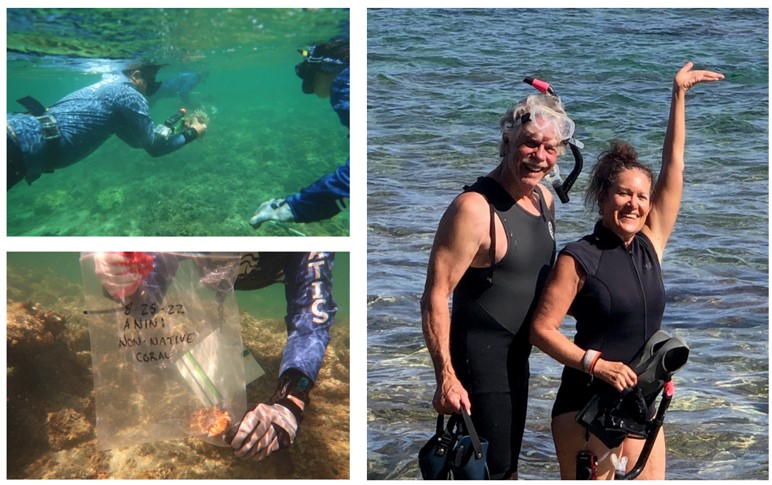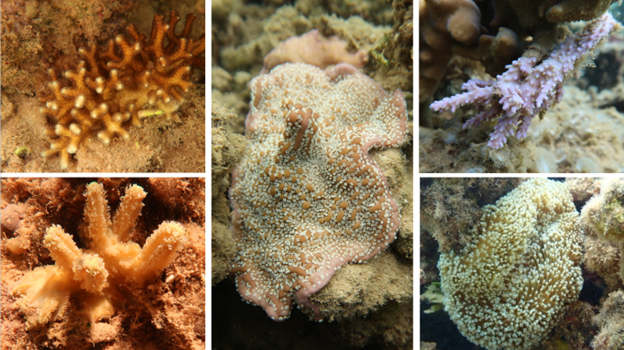1/22/24 – Non-native corals removed from Anini lagoon on Kauai
In the summer of 2021, Robin Mazor and Tom Woods with the non-profit organization Reef Guardians Hawaiʻi contacted the Division of Aquatic Resources (DAR) to let them know that while snorkeling in the lagoon at ʻAnini (Wanini) beach on Kauaʻi, they saw some corals that were unfamiliar to them and appeared to have been placed onto the reef. DAR looked at their photos and confirmed that the corals were not native corals found in Hawaii. The DAR Aquatic Invasive Species (AIS) team came out and removed the colonies from the reef. During removal, some of the corals were found to have zip ties in what appeared to be an attempt at attaching the corals to the reef. Others were found with coral “plugs” that are used in other parts of the world to grow and outplant coral. Several different species were found, all of them are commonly used in saltwater aquariums. It became clear that someone had intentionally placed these non-native corals in the reef.

DAR team collects non-native coral from ʻAnini reef. Tom Woods and Robin Mazor of the Reef Guardians who originally reported the non-native coral.
Perhaps this person was well-meaning, but there are several problems presented by non-native corals in Hawaiian reefs. The first is that importing non-native corals to Hawaiʻi is against the law. Some people will bring them to Hawaiʻi to put in their aquarium tanks because they think they look pretty, but the Hawaiʻi Department of Agriculture restricts the importing of corals and many other animals that could be harmful to the ecosystem if they escaped. Another problem is that putting these corals on the reef in Hawaiʻi may lead to new diseases being brought into the area. Fish or invertebrates that feed on coral may also be exposed to disease if the coral carries unknown pathogens. Furthermore, if the coral survives in this new environment, it poses another problem by competing with native coral species in the ecosystem. There is a delicate balance in coral reefs, and when other species are introduced that don’t belong there, they can upset that balance and possibly over-take the native species.

Some of the non-native coral species found on the reef at ʻAnini.
Since the first sighting in 2021, Reef Guardians has continued to monitor and report findings of non-native coral at ʻAnini, most recently in November of 2023 when a colony of leather coral was found and removed. DAR believes these are still the remnants of the first out-planting of non-native coral, especially since they have been found in the same general area. Each time they were reported, DAR has responded and removed the non-native coral, but it shows how important it is that the community keeps an eye out for things that don’t look right on the reefs. DAR depends on the amazing help from Reef Guardians and other keen observers to be made aware when issues arise in the aquatic environment.
You can help keep invasive species off our reefs by reporting potential sightings to DAR’s Aquatic Invasive Species team. Send a picture, description, and as precise of a location as possible to [email protected]. Click here to read a blog post about DAR’s rapid response to potential new invasions.
If you have an aquarium and need to dispose of your fish or other aquatic life, please do not release them in the ocean or streams. Even if you have native animals in your aquarium, you could introduce disease into the environment. The proper way to dispose of legal aquatic life is to either humanely euthanize them or reach out to other aquarium owners or pet stores who may be happy to take your animals. The Hawaii Department of Agriculture has an amnesty program that allows anyone to turn in illegal animals without penalty. See https://hdoa.hawaii.gov/pi/pq/amnesty-program-2/ for more information. If you have coral, regardless of whether it is native or not, it is illegal to sell it or cultivate it without a permit (HAR 13-95-70, HRS 187A-6); contact your local DAR office for guidance.
For further reading, see the following pages:
Hawaii coral and live rock rules.
FAQ for coral cultivation and restoration activities
DAR coral nursery and restoration program
DAR coral nursery Instagram page
If you see illegal activity, you can report it to the Division of Conservation and Resource Enforcement at (DOCARE) at 1-855-DLNR-TIP (1-855-356-7847), or the Fish and Wildlife Service Tip line 1-844-FWS-TIPS (1-844-397-8477). You can also contact your local DAR office for any questions or concerns.
